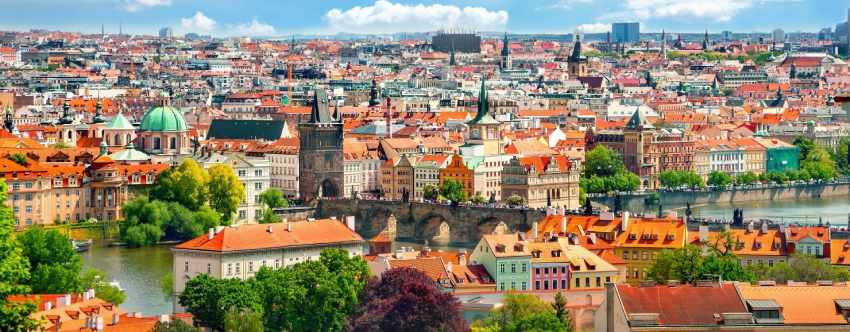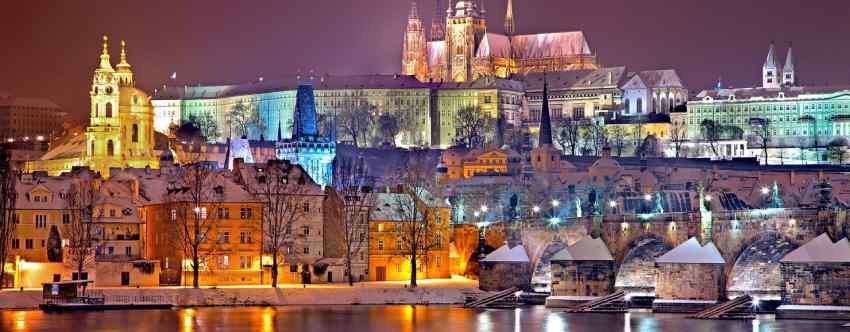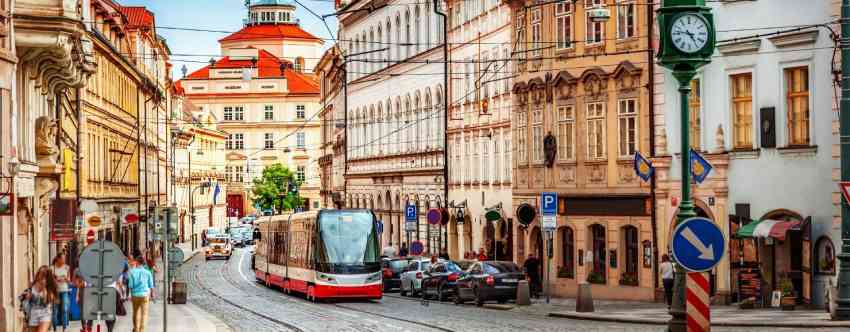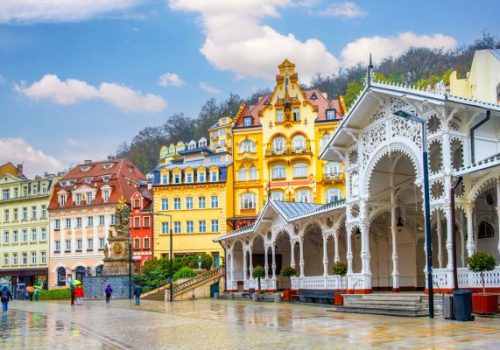Live and work in Prague
Prague, the capital of the Czech Republic, is a city of stunning architecture, rich history, and vibrant culture. Known as the “City of a Hundred Spires,” Prague is one of Europe’s most picturesque capitals. Beyond its charm, the city offers a thriving economy, a low cost of living compared to Western Europe, and a welcoming environment for expats. This guide provides everything you need to know about living and working in Prague, covering job opportunities, salaries, accommodation, and everyday life.
Latest jobs in Prague and Czech Republic
- Customer support
- Czechia
- Customer support
- Czechia
Working in Prague
Working Conditions in Prague
Prague provides a structured and employee-focused work environment, adhering to the high standards of the European Union. A standard workweek is 40 hours, generally from 9 am to 5 pm, Monday to Friday. Employees are entitled to 20 days of annual leave, along with 13 public holidays, ensuring plenty of time for relaxation and travel.
Czech labor laws ensure fair wages, regulated working hours, and job security. Many companies, particularly in sectors like IT and finance, offer flexible working hours, remote work options, and modern office setups. The city is also becoming a hotspot for coworking spaces, catering to freelancers and remote workers.
For employees, additional benefits such as meal vouchers, private healthcare, and professional development opportunities are often included in compensation packages. These perks make Prague an attractive destination for expats seeking a supportive work environment.
Job Opportunities in Prague
Prague is the economic and cultural hub of the Czech Republic, offering diverse opportunities across industries. The city is a magnet for expats due to its growing demand for skilled professionals in IT, finance, healthcare, education, and tourism.
IT and Technology Sector
The IT sector is one of Prague’s fastest-growing industries, with multinational companies and start-ups actively hiring software developers, IT project managers, data analysts, and cybersecurity specialists. Companies like SAP, Microsoft, and Oracle have significant operations in Prague, while a thriving start-up ecosystem provides additional opportunities for tech-savvy professionals.
Finance and Banking
Prague is a regional financial hub, with roles in accounting, investment banking, and financial consulting widely available. Major financial institutions, such as Erste Group Bank and Komerční banka, provide opportunities for expats with expertise in finance, risk management, and fintech.
Tourism and Hospitality
Tourism continues to thrive, making hospitality and event management key sectors for employment. Opportunities range from hotel management and tour guiding to roles in restaurants and cultural event planning, particularly for English-speaking expats.
Healthcare and Education
Private hospitals and international schools in Prague frequently seek English-speaking professionals, including teachers, medical practitioners, and support staff. Universities such as Charles University and Czech Technical University also offer research and academic positions.
Business Process Outsourcing (BPO)
Prague’s BPO sector is robust, with many international companies setting up shared service centers. Roles in customer support, HR, and IT support are common, particularly for multilingual professionals.
Networking is essential for job hunting in Prague. Platforms like Jobs.cz, LinkedIn, and expat groups provide valuable connections. Attending industry events and professional meetups can further expand your career prospects.
Freelancing and Remote Work in Prague
Prague is an increasingly attractive city for freelancers and remote workers. The rise of coworking spaces like Impact Hub Prague and WorkLounge has created a supportive community for independent professionals. The freelance visa, or “Živnostenský list,” allows expats to operate as self-employed individuals, particularly in fields such as IT, design, and consulting.
Salaries in Prague
Salaries in Prague are competitive for Central Europe, though they may be lower than in Western European capitals. The average monthly gross salary is approximately CZK 45,000 (€1,800). However, highly skilled professionals can command much higher earnings:
- IT professionals and engineers: CZK 70,000 to CZK 120,000 (€2,800–€4,800) per month
- Finance and consulting: CZK 50,000 to CZK 90,000 (€2,000–€3,600)
- Customer service and administrative roles: CZK 30,000 to CZK 50,000 (€1,200–€2,000)
While salaries may be lower than in Berlin or Vienna, Prague’s affordable living costs ensure a high standard of living for most residents.
Income Tax in Prague
The Czech Republic has a flat income tax rate of 15% for most workers, with a solidarity tax of 23% applied to income exceeding a certain threshold. Social security and healthcare contributions, which total around 11% of gross income, are also deducted from salaries.
Expats must register with the Czech Tax Administration and obtain a tax identification number. The Czech Republic’s double taxation agreements with many countries help avoid being taxed twice on the same income.
Working Culture in Prague
The working culture in Prague emphasizes professionalism, efficiency, and respect for work-life balance. Meetings are punctual and agenda-driven, while collaboration and teamwork are highly valued. Many companies in tech and creative industries have adopted modern workplace practices, including flexible hours, casual dress codes, and team-building activities.
Traditional industries, such as manufacturing, tend to follow more formal hierarchies. Networking is an integral part of Prague’s business landscape, and cultivating strong relationships with colleagues and clients can enhance career success.

Living in Prague
Benefits of Living and Working in Prague
Prague’s high quality of life, combined with its cultural richness and affordability, makes it a popular destination for expats. The city offers world-class healthcare, excellent public transport, and a vibrant arts and entertainment scene. Its compact size and walkability ensure that most attractions, workplaces, and amenities are easily accessible.
Prague’s location in Central Europe allows for convenient travel to neighboring countries like Germany, Austria, and Poland, making it an ideal base for exploring Europe. The city is family-friendly, with numerous parks, international schools, and community events.
Accommodation in Prague
Finding accommodation in Prague is relatively straightforward, with options ranging from modern apartments to historical buildings. A one-bedroom apartment in the city center costs between CZK 20,000 and CZK 30,000 (€800–€1,200) per month, while apartments in suburban areas cost around CZK 15,000 to CZK 20,000 (€600–€800).
Shared accommodations are common among students and young professionals, with costs starting at CZK 8,000 (€320) per person. Utilities, including electricity, water, and heating, add approximately CZK 3,000 to CZK 5,000 (€120–€200) per month.
Platforms like Sreality.cz and real estate agencies can help you find suitable housing. Most landlords require a deposit equivalent to one or two months’ rent.
Cost of Living in Prague
Prague offers an affordable cost of living compared to many European capitals. A single person can live comfortably on a monthly budget of CZK 35,000 to CZK 50,000 (€1,400–€2,000). Key expenses include:
- Groceries: CZK 4,000 to CZK 6,000 (€160–€240) per month
- Dining Out: Meals at mid-range restaurants cost CZK 200 to CZK 400 (€8–€16), while a beer at a local pub averages CZK 50 (€2)
- Public Transport: Monthly passes for buses, trams, and the metro cost CZK 550 (€22)
Public Transport in Prague
Prague boasts one of the best public transport systems in Europe, with an extensive network of buses, trams, and metro lines. A monthly pass costs CZK 550 (€22), providing unlimited access to all modes of transport. The system is highly efficient, making it easy to navigate the city without a car.
For cycling enthusiasts, bike-sharing services like Rekola and dedicated bike lanes make cycling a convenient option for short commutes. Prague’s central train station, Hlavní nádraží, connects the city to major European destinations, while the Václav Havel Airport offers international flights.

Eating in Prague: Restaurants and Food Costs
Prague’s culinary scene is diverse, with a mix of traditional Czech dishes and international cuisines. Local specialties such as svíčková (marinated beef with cream sauce) and trdelník (chimney cake) are must-tries.
Casual dining is affordable, with meals costing around CZK 150 to CZK 250 (€6–€10). For groceries, markets like Naplavka Farmers’ Market and supermarkets like Albert and Lidl offer fresh produce and daily essentials.
Prague’s Nightlife
Prague’s nightlife is legendary, offering something for everyone. The Old Town and Žižkov neighborhoods are home to a mix of cozy pubs, rooftop bars, and nightclubs. Live music venues, jazz clubs, and beer gardens add to the city’s vibrant social scene. Seasonal events, like the Czech Beer Festival and the Prague Spring International Music Festival, highlight Prague’s cultural flair.
Weather in Prague
Prague has a continental climate, with warm summers and cold winters. Summer temperatures range from 25°C to 30°C (77°F to 86°F), while winter averages -5°C to 0°C (23°F to 32°F), with occasional snowfall. Spring and autumn are mild, perfect for exploring parks like Letná Park and Stromovka.

What Not to Miss in Prague (As a Local)
Living in Prague offers a unique blend of cultural, recreational, and social activities that make it more than just a tourist destination. As a resident, you’ll discover hidden gems, favorite local hangouts, and routines that make life in the city vibrant and enjoyable. Here’s a guide to the best things to do and places to explore as a local living in Prague.
Neighborhoods to Explore and Hang Out
Vinohrady
This trendy, upscale neighborhood is a favorite among expats and locals for its cafés, wine bars, and green spaces. Vinohrady’s parks, such as Riegrovy Sady, are perfect for picnics or enjoying panoramic views of the city skyline. The area also hosts regular farmers’ markets, offering fresh produce and artisanal goods.
Karlin
Once an industrial area, Karlin has transformed into one of Prague’s hippest districts. Known for its modern architecture, creative spaces, and excellent restaurants, Karlin is a hub for young professionals. Spend your evenings here enjoying live music at Kasárna Karlín or grabbing a bite at one of its chic bistros.
Žižkov
Žižkov’s bohemian vibe and vibrant nightlife make it a must for those seeking quirky bars and cultural venues. The Žižkov Television Tower, a controversial yet fascinating landmark, offers breathtaking views of the city. Its nearby parks, like Parukářka, are great for morning runs or lazy weekend strolls.
Holešovice
This cultural district is home to contemporary art galleries like the DOX Centre for Contemporary Art, unique coffee shops, and coworking spaces. On weekends, visit the Holešovice Market for fresh food, vintage finds, and handmade goods.
Places to Go Running or Working Out
Stromovka Park
As Prague’s largest park, Stromovka offers extensive running trails, cycling paths, and green spaces for outdoor workouts. It’s also a peaceful spot for yoga or meditation sessions. The park’s serene ponds and tree-lined avenues make it a favorite among fitness enthusiasts.
Letná Park
Located on a hill overlooking the Vltava River, Letná Park is a fantastic spot for jogging with a view. The wide open spaces are ideal for group workouts, while the beer garden here is a great post-run treat.
Vyšehrad
This historical fortress not only offers stunning views of Prague but also serves as a great workout destination. Its steep paths and stairs are perfect for intense cardio sessions, and the quiet gardens make it a lovely place to cool down afterward.
The Vltava River Path
For runners who prefer riverside scenery, the paths along the Vltava River are a perfect choice. Stretching through multiple districts, these trails are ideal for both short runs and long-distance training. You’ll often see locals cycling or rollerblading here as well.
Fitness Studios and Gyms
Prague is home to numerous fitness centers like Form Factory and boutique studios offering yoga, pilates, or CrossFit classes. Many gyms provide affordable membership options, and some parks host free group workouts during the warmer months.
What to Do on Weekends
Outdoor Adventures
For nature lovers, weekends in Prague often mean escaping the city for a hike in the Bohemian Switzerland National Park or Karlštejn Castle. These spots are just a short drive or train ride away and provide stunning landscapes, from rocky cliffs to lush forests.
Cultural Immersion
Spend your weekends exploring Prague’s cultural side. Visit Divadlo Na Zábradlí or Laterna Magika for contemporary and experimental theater. Music enthusiasts can attend concerts at the Rudolfinum or enjoy jazz performances at intimate clubs like Agharta Jazz Centre.
Markets and Festivals
Prague’s weekend markets are a treat for locals. The Naplavka Farmers’ Market along the riverbank is a lively spot to shop for organic produce, baked goods, and locally crafted items. Seasonal events like the Signal Light Festival and Designblok add even more excitement to the city’s calendar.
Cafés and Reading Spots
Prague has a strong coffee culture, with cozy spots like Café Savoy and Kavárna Slavia providing perfect places to relax with a book or catch up with friends. Libraries such as the Municipal Library of Prague offer peaceful environments for reading and studying.
Socializing and Networking
Expats’ Meetups
Prague’s expat community is active and welcoming. Join groups like Internations Prague or attend meetups through platforms like Meetup.com to make connections and explore the city with like-minded individuals.
Beer Gardens
Prague is famous for its beer culture, and visiting local beer gardens like Riegrovy Sady or Letná Beer Garden is a quintessential experience. These spots are perfect for unwinding with friends and soaking up the lively atmosphere.
Sports Leagues and Hobby Groups
Many locals and expats join recreational sports leagues for football, tennis, or volleyball. Hobby groups focused on photography, hiking, or board games are also great ways to spend weekends while meeting new people.
Relaxation and Wellness
Spa Days
Prague has a variety of wellness centers and spas. Places like The Alchemist Spa or Tawan Thai Massage offer a chance to relax and rejuvenate. For a unique experience, visit Karlovy Vary, a famous spa town just a couple of hours from Prague.
Public Pools and Saunas
In summer, locals flock to public pools like Podolí Swimming Complex. Many gyms and wellness centers also offer saunas, a popular way to unwind during Prague’s colder months.
Seasonal Highlights
Spring and Summer
During warmer months, Prague comes alive with outdoor festivals, rooftop bars, and open-air cinemas. The Prague Castle Gardens and Petřín Hill are excellent places for picnics, while the Vltava River is perfect for paddleboarding or renting a small boat.
Autumn
Autumn in Prague is a magical time, with parks like Divoká Šárka and Prokopské Údolí transforming into vibrant hues of red and orange. Local wine festivals, such as Vinobraní, celebrate the harvest season with tastings and cultural events.
Winter
In winter, Prague’s Christmas markets are an absolute delight for locals and visitors alike. Ice skating rinks pop up in parks and public squares, adding to the festive atmosphere. Cafés serve mulled wine and warm pastries, making chilly days cozy and enjoyable.
Living in Prague is about more than just visiting its famous landmarks; it’s about immersing yourself in its neighborhoods, building routines that suit your lifestyle, and discovering the activities that make each day fulfilling. With its rich blend of cultural, recreational, and social opportunities, Prague is a city that truly caters to its residents.
Live and work in Prague FAQs
How much do people earn in Prague?
The salary in Prague, as in many other cities, varies depending on sector, occupation, experience and other factors.
The average monthly salary in the Czech Republic hovers around CZK 32,000 to CZK 35,000. This is about €1,261 to €1,379.
Keep in mind that this can fluctuate depending on the exchange rate. Keep in mind that this can fluctuate depending on the exchange rate.
Is living in Prague expensive?
In general, Prague is considered fairly affordable to live in compared to many other European capitals. The cost of living, including accommodation, groceries and eating out, is generally cheaper. Rental prices are generally lower, and local markets offer affordable groceries. Public transport is efficient and affordable. Of course, this all depends on your lifestyle; you can make it as expensive or cheap as you like.
What language do they speak in Prague?
In Prague, as in the whole of the Czech Republic, Czech is spoken. Czech is the country’s official language.
Although many Czechs in urban areas , especially in tourist areas, often understand and speak English, it is useful to know some basic words and phrases in Czech, especially when travelling outside tourist areas.
Can I pay with the euro in Prague?
Although a member of the European Union, the Czech Republic still uses the Czech koruna (CZK) as its official means of payment. The euro is therefore not accepted as a means of payment in Prague or other parts of the Czech Republic
How much does a flat in Prague cost?
A 1-bedroom flat in Prague costs around CZK 15,000 – CZK 25,000 per month. This amounts to about €600 – €1,000 per month. This depends on the location.




